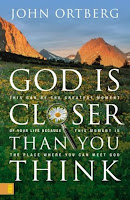 |
| (Amazon UK link) |
I first read ‘God is closer than you think’ in 2009, and liked it very much. But in more than a decade I had forgotten what it was about, so it was more than time for a re-read. I’ve read a chapter each day for the past ten days, and once again thought this book excellent.
The focus of the book, unsurprisingly, is on finding and communicating with God. Ortberg gives some nice analogies, one of which appears several times: that of looking for God being a bit like a ‘Where’s Wally?’ picture (or, rather, ‘Where’s Waldo?’, since it’s an American book). It’s all too easy to get distracted by everything that’s going on around us, and miss God’s presence - which is not necessarily where we expect it.
Ortberg also focuses on the need to concentrate on now - on today, which is the only time in which we live. It’s easy to get caught up in regrets or nostalgia for the past, or dreams for the future. But while memories can be positive, and planning is sometimes essential, we are actually living right now. The past can’t be changed, and we don’t know what might change in the future. That’s all the more relevant at the end of 2020, a year when almost all plans were turned upside down as the pandemic spread.
The author quotes from Brother Lawrence and others who made an effort to think about God in all they did - in everyday chores and interactions as well as while reading their Bibles or attending Church services. He gives examples and anecdotes showing that very often we need to start somewhere small: in being kind to our relatives, avoiding sarcastic comments, smiling at harassed shop workers, staying calm and patient while waiting in long queues.
There’s a helpful chapter on paths to spirituality, quoting Gary Thomas and his excellent book ‘Sacred Pathways’. I remember finding it encouraging when I first read Ortberg’s book - perhaps it was this that inspired me to find some of Gary Thomas’s writing - as I’m not the kind of person who necessarily finds singing, or church services helpful.
I like people and small groups, but am far from being an extravert. I like nature, but have no real spiritual need for it. I like reading but am not an academic. I’m certainly not an activist, and while I know that serving is a good idea, I tend not to notice opportunities to serve, and when I do, I don’t find them particularly fulfilling. But the contemplative path - one of needing a great deal of time alone, to ponder, to think and to write - describes me perfectly.
Thomas actually describes nine spiritual pathways, and goes into them in a great deal more depth than Ortberg does, but it was still a useful reminder in this book that there are many ways of finding and relating to God, and that while we probably all have elements of all of them, none is ‘better’ than any other. God made us as we are, and we need to find him in the ways he built into our personalities.
There’s much more in the book, including a chapter about how to find God when we feel low, or as if we’re just talking to a blank wall. And finally there’s a chapter pointing out that the Gospel message is not primarily about life after death (although that’s important) but about God being here with us now. As Christmas approaches and people are more aware of God coming into the world as Emmanuel (‘God with us’) it’s important to remember this.
The writing is excellent, with just the right balance between Scripture exposition and personal anecdotes, either from the author's own life and ministry, or from other friends and relatives. He quotes other writers too, as relevant, and I found it a very readable book.
All in all, I would recommend this book highly to anyone who is a Christian believer, or interested in knowing how Christian belief works, or who would simply like to feel closer to God.
Review copyright 2020 Sue's Book Reviews
No comments:
Post a Comment